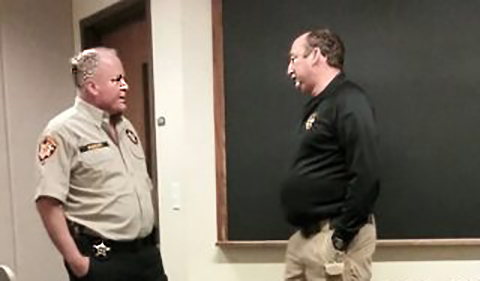Retired Sgt. Duane Covert of the Nelsonville Police Department and Sgt. Rich Prescott of the Butler County Sheriff’s Office visited Molly Covert‘s SOC 2600: Criminal Justice class on Feb. 2.

The speakers began with short introductions before diving into questions from students.
After attending Hocking College, Covert worked for the Nelsonville Police Department for 20 years. During that time, Covert spent more than seven years as military law enforcement. He also spent time as a reserve deputy, and on the county SRT team as a sniper. Shortly after retiring, he was assigned to the Major Crimes Narcotic Task Force.
Active Sgt. Prescott, of the Butler County Sheriff’s Office, began his career in 1995, after attending Bowling Green State University. Prescott spent time as a helicopter pilot, along with spending three years in vice and eight years in detectives. Prescott has been a Sergeant since his promotion in 2007.
As the questions came rolling in, everyone wanted to know the best, and worst parts of working in law enforcement. Covert started out by discussing the struggles of “dealing with human tragedies and human miseries,” as Prescott nodded in agreement.
Prescott then chimed in to discuss the struggles of separating work life from home life. Dealing with tragedies can be difficult, but Prescott has always known that he does not want to mix his work and home. Yet sitting around the squad table every day before his shift and talking with his “work family” helps to keep him going through the rough times. Enjoying conversation and being able to talk about work with people who understand what he is dealing with is very important to him.
After that, questions began to get a little more serious, as some students in the class raised a few concerns about police brutality. In particular, a few students wanted to know if Covert or Prescott have felt a change in attitude with the way community members view law enforcement in wake of recent police brutality incidents happening across the country.
Prescott noted that he has not felt any changes in the way that people in the community view him, adding that it is “very humbling to have people thank [him] for his service.” He adds that there have always been good cops and bad cops. Recently in the news, however, a lot of attention is paid to bad cops who make poor decisions.
Next, a question about racial profiling was asked. Covert emphasized that he always made sure to “treat everyone equally under the law.” He notes, however, that other forms of profiling did happen while on the job. If he noticed people who exhibit behaviors that he and his research team associate with meth labs, necessary actions were taken.



















Comments